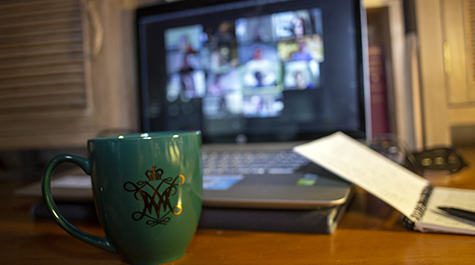William & Mary Law Students Maintain Community of Care During Pandemic
A generous and close-knit camaraderie has long been a point of pride at William & Mary Law School. And it’s more evident than ever during the COVID-19 pandemic.
“Our students are resilient and our spirit of community has warmed my soul,” said Nick Armah J.D. ’21, President of the Student Bar Association (SBA). “Though this is a hard time for all students, we still have to recall how differently the pandemic has impacted various members of our community.”
Armah says he is “grateful and humbled” to be a member of a community that strives to ensure that all students, regardless of circumstance, have the resources they need to be healthy and well during this time.
“Our administration and faculty have done a wonderful job coming together to support students and the community overall,” Armah said.
Mikaela Phillips J.D. ’21 thinks the Law School has worked hard to maintain the “community of care” that William & Mary students are known for.
“I serve on SBA with Nick, and we’ve all been working tirelessly to make sure every student question or concern is addressed or channeled to the administration,” Fellows said. “Early on I also spent a lot of time Zooming with my section (I'm a Fellow in the Legal Practice program) and my various 1L mentees about class registration, because they were very nervous.”
As her 1L year comes to a close online, Alexandra Fellows J.D. ’22 is impressed with how members of the Law School are supporting one another. She notes that the ordinary things consuming students’ lives—i.e., rankings, grades, deadlines, outlining, cold-calls—appear less important.
“It seemed that in the midst of all of the chaos, we returned to our core value of becoming ‘citizen lawyers’—citizens first, lawyers second,” Fellows said. “What now has risen to the surface is the deep level of care our community has for one another.”
Fellows sees that care whenever the administration holds town halls to provide guidance during an unprecedented time, or when students advocate for one another regarding various closures on campus, or when professors work tirelessly to teach material and don’t always see student reactions or faces or, sometimes, even questions.
“The professors’ and administration’s understanding of individual circumstances has become crucial to students’ feeling supported and heard,” Fellows said. “Learning under adversity and stress has become what is valued, not your GPA; taking care of students and professors alike is valued, not your class-ranking. I believe this switch to online learning in the face of a pandemic has forced us to dive into our mission of being citizens first.”
James Lemay J.D. ’22 praises faculty for being available outside of online classes to accommodate students’ needs.
“That has included extra office hours via Zoom and taking student suggestions in order to adjust their lecture format, among other initiatives,” he said.
Katheryn J. Maldonado J.D. ’21 finds that having plenty of work to distract her has been helpful, and like her fellow students, she praises faculty for keeping classes interactive and trying to maintain some sense of normalcy. She adds to the general consensus that students have done a tremendous job in supporting each other.
“I know that I have had Zoom lunches with friends during our traditional lunch hour times; I've also had game nights with friends, which helps me take the much needed break from school and everything else that is going on,” Maldonado said. “Even the wellness opportunities that have been provided by main campus have been very helpful during the transition.”
For Lemay, the amount of study time has remained relatively unchanged, but he says he needs to pace his reading so he can step away for his mental health.
“I’m definitely making sure that I get outside for an hour everyday to do something physical,” Lemay said. “I usually work out fairly often and the gym has typically been the place where I decompress, but since the gyms have closed, I’ve began to get creative with workouts outside.”
For Abby Hylton J.D.’22, decompression means going on walks despite the seasonal pollen, following a daily yoga video, and ordering puzzles in the mail.
“It’s kind of grandmotherly, but it’s nice to have a glass of wine and do a puzzle every evening, and I’m drawing and being creative in my spare time,” Hylton said.
Mikaela Phillips definitely misses face-to-face interaction, but as with school work, there are virtual workarounds.
“While it can be lonely at times, my various friend groups have still been able to hang out virtually—we’ve done game nights and bar reviews via Zoom” she said. “I'm really looking forward to one giant law school group hug in the lobby when we (hopefully!) return in August!”
Nick Armah seconds that, and remains an upbeat presence as he works with fellow students as part of the SBA.
“Though this is a difficult time for students given the intricacies of online learning, differential learning environments, health and wellness concerns, and various other impediments to education, I am sure our community will come out of this strong and unified,” Armah said.
About William & Mary Law School
Thomas Jefferson founded William & Mary Law School in 1779 to train leaders for the new nation. Now in its third century, America’s oldest law school continues its historic mission of educating citizen lawyers who are prepared both to lead and to serve.
